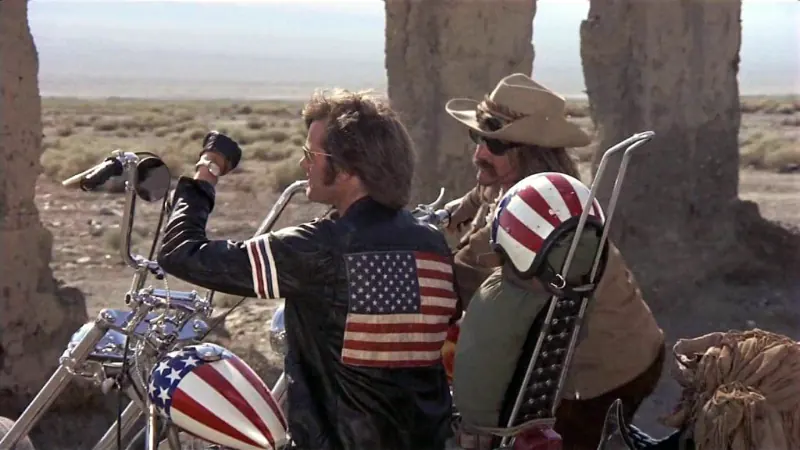Dennis Hopper & Peter Fonda In Easy Rider
Isn’t it great when you watch a movie for a second, third, umpteenth time, and - finally - you get it?
I had seen Easy Rider only once before, a long time ago. In fairness, I was never too keen on seeing it again. My recollection of it was slow, self-indulgent and celebrating a culture I don’t see myself connecting with. But recently I studied movie thresholds, and I wanted to understand what this legendary road movie had to say about it.
RIDER WITH A CAUSE
Billy (Hopper) and Wyatt/Captain America (Fonda) are two seemingly careless bikers who finance their freedom by doing the occasional big drug deal. Against some spectacular cinematic backdrops - trademark of the movie and its cinematographer Laszlo Kovacs - the credit sequence gives us a first threshold trip, leading us into the story. This may be an arthouse pic, but one with a clear visible goal: to make it to New Orleans in time for Mardi Gras.
The hippies pick up a hitchhiker, fill up with gas, and cruise through Monument Valley, where they rest for the night. After the beauty and freedom of the riding scenes, Fonda’s character seems reflective, and perhaps even tormented. Billy asks “What’s the matter?” Wyatt replies: “I’m a little tired.” Later he says “I’m just getting my thing together.” And I believe that’s exactly what this movie is about.
CAPTAIN AMERICA’S QUEST
Easy Rider is Captain America’s quest for identity and purpose, and by association, it is the nation’s journey towards redemption, possibly over Vietnam, and definitely towards native Americans. When Billy laughs irreverently, the hiker tells him to be ‘a trifle polite’, as “the people this place belongs to are buried right under you.” But Billy has long lost any values he might have had, as he floats from one high to the next, ignorant and numb. Wyatt seems to more aware, hopeful for that redemption. If only he might find himself somewhere along Route 66.
A scene early in the movie sets it up for me, subtly and subtextually. Billy (Hopper) and Captain America (Peter Fonda) invite themselves for dinner with a farmer, who is surrounded by a multitude of children “My wife is catholic, you know.”
Then, Wyatt speaks a few lines of dialogue that receive their resonance later in the film. He commends the rancher on the fact that he’s built a good living for himself. This is not small talk. Wyatt is considering a lifestyle very different from his own, as he clarifies: “No, I mean it, you've got a nice place. It's not every man that can live off the land, you know. You do your own thing in your own time. You should be proud.”

UNDER THE SUBTEXT
I disagree with most common definitions of subtext. Subtext is not the opposite of ‘on the nose’. It is not ‘what the line really means’. To me, subtext requires more effort to be understood, and a whole lot more to write. Subtext is the meaning layer of a story element that we are not (yet) aware of. And sometimes, this is exactly what is being said.
Although Captain America is literally saying what he means, in this context it is true subtext. It will gain greater depth as the movie rolls on, and if we make an effort, we will slowly become aware of it.
Wyatt is ready to seek a new purpose, and he even considers settling.
Karel Segers
Karel Segers wrote his first produced screenplay at age 17. Today he is a story analyst, script editor and producer with experience in rights acquisition, script development and production. His
screenwriting classes have trained writers in Australia, Europe, Asia and the Middle East, and his clients include international award-winning filmmakers as well as three Academy Award nominees.
Karel is the founder of
The Story Department and he ranks in the world's Top 10 of most influential people for screenwriting on Twitter.